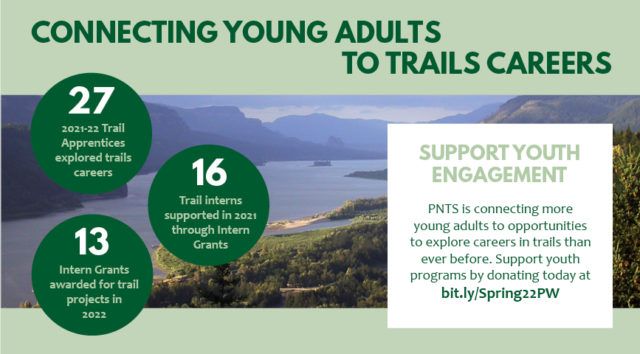This column shines a light on rising leaders in public lands and outdoor recreation who participate in PNTS’ Trail Intern Grants or Trail Apprentices Program (TAP). Trail Intern Grants help organizations hire interns to further their missions and expand their capacities. The TAP helps up-and-coming and aspiring outdoor professionals aged 18-28 network and discover pathways to careers in trails or similar fields.
“I wanted to learn about trails, how communities connect to trails, and how I can be a trail steward and protect our environment in more ways. Not only did I want to learn how to conserve trails, but how to make the trails system more inclusive,” says Callum Cintron, a 2021 PNTS Trail Apprentice Program (TAP) participant. Callum entered the TAP with a passion for making the outdoors more accessible “for all people, regardless of race and ability.”
Callum became disabled in 2018, which drastically altered their access to the outdoors. Becoming a Trail Apprentice let Callum “reconnect with nature in a new way that accommodated my current life.” And though they were able to connect to the National Trails System (NTS) through the TAP, they continue to push for an even more accessible NTS which is open and welcoming.
Callum’s ongoing work and volunteerism in social and environmental justice organizations demonstrate their determination to participate in changes that will have far-reaching positive impacts on the environment and humanity. Callum asserts, “As a transgender and disabled individual, I know that if we do not do this work ourselves, no one is going to do it for us. I do this work and let it consume so much of my time because it is about life. This work saves people and nature’s lives.”
As an Environmental and Cultural Studies major at Oregon State University, Callum is learning about and asking significant questions about access to the outdoors and climate justice. Throughout the TAP they applied those questions to the National Trails System. They questioned why there wasn’t a broader diversity in trails leadership, if programs existed to help people who usually don’t have access to trails gain access, and if anything was being done to increase safety for groups who have historically been harmed in the outdoors like LGBTQ+, BIPOC and Disabled communities. In the future, they will continue to ask these questions, and hope to work to implement solutions that will make the NTS truly accessible to all.

